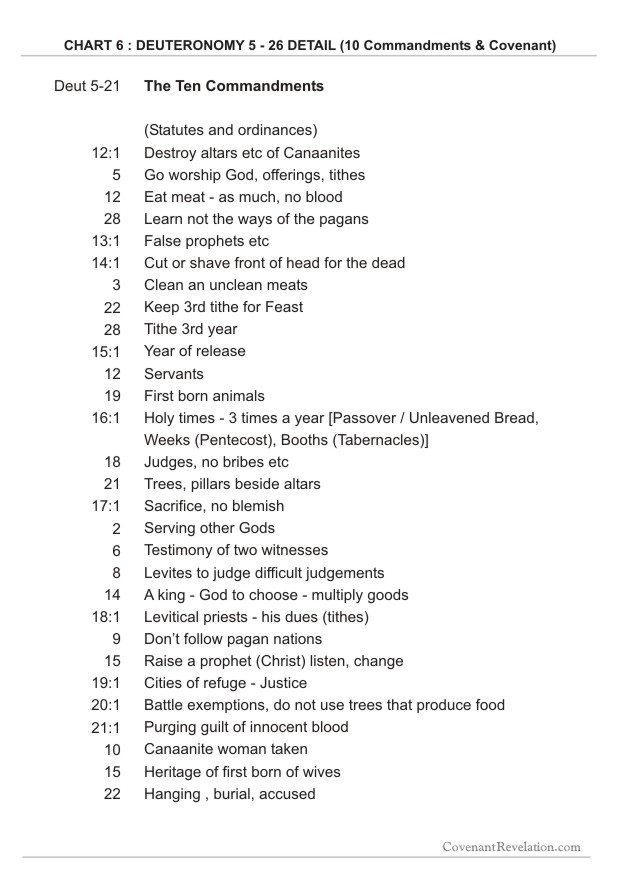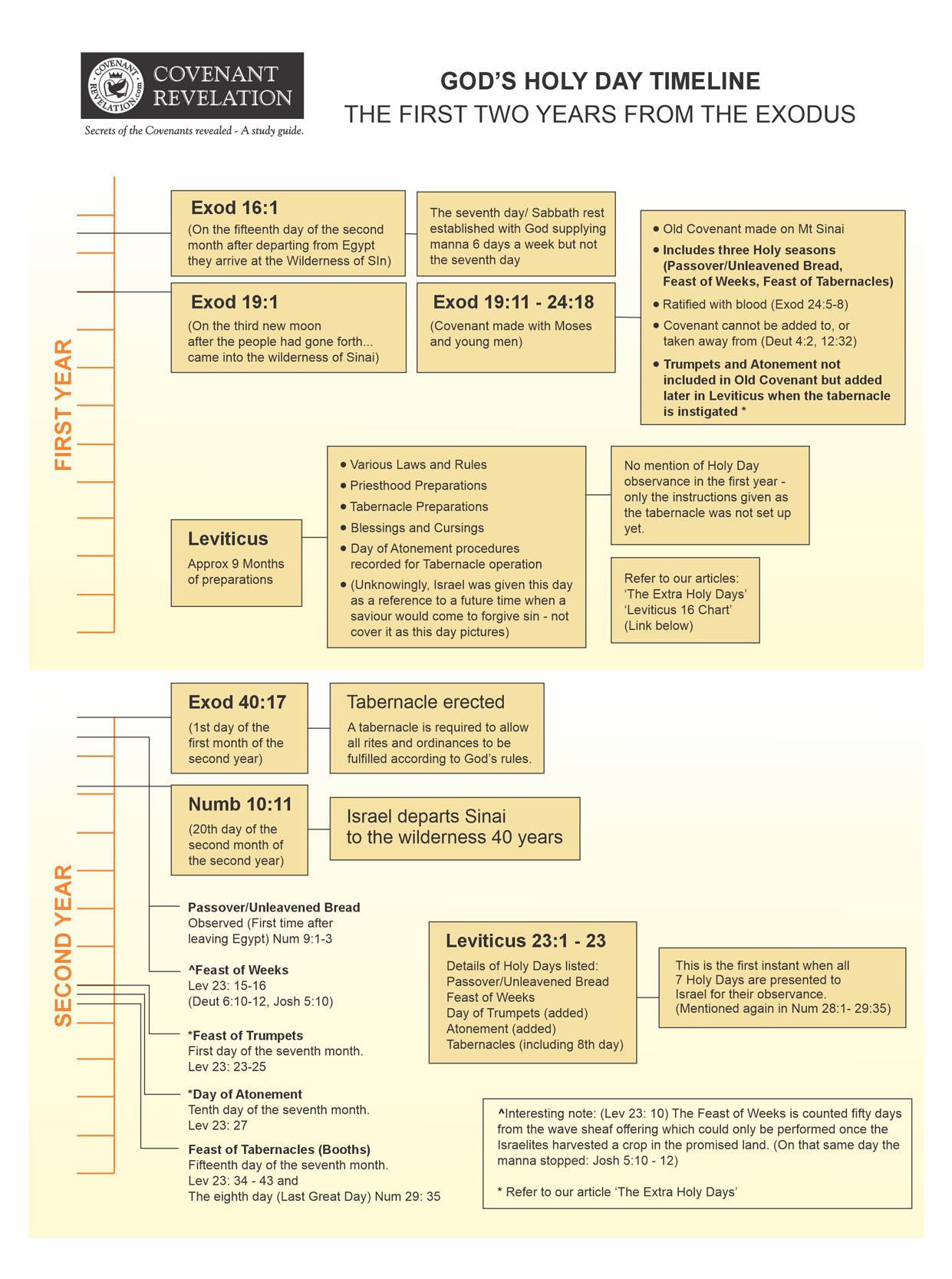
Category: Charts & Resources
Leviticus 16 Chart
This easy to read chart shows all the events which occurred at the Tabernacle on the Day of Atonement.
Follow the sequence of events as per the boxes and the accompanying scriptures to reveal the meaning of the ceremony.
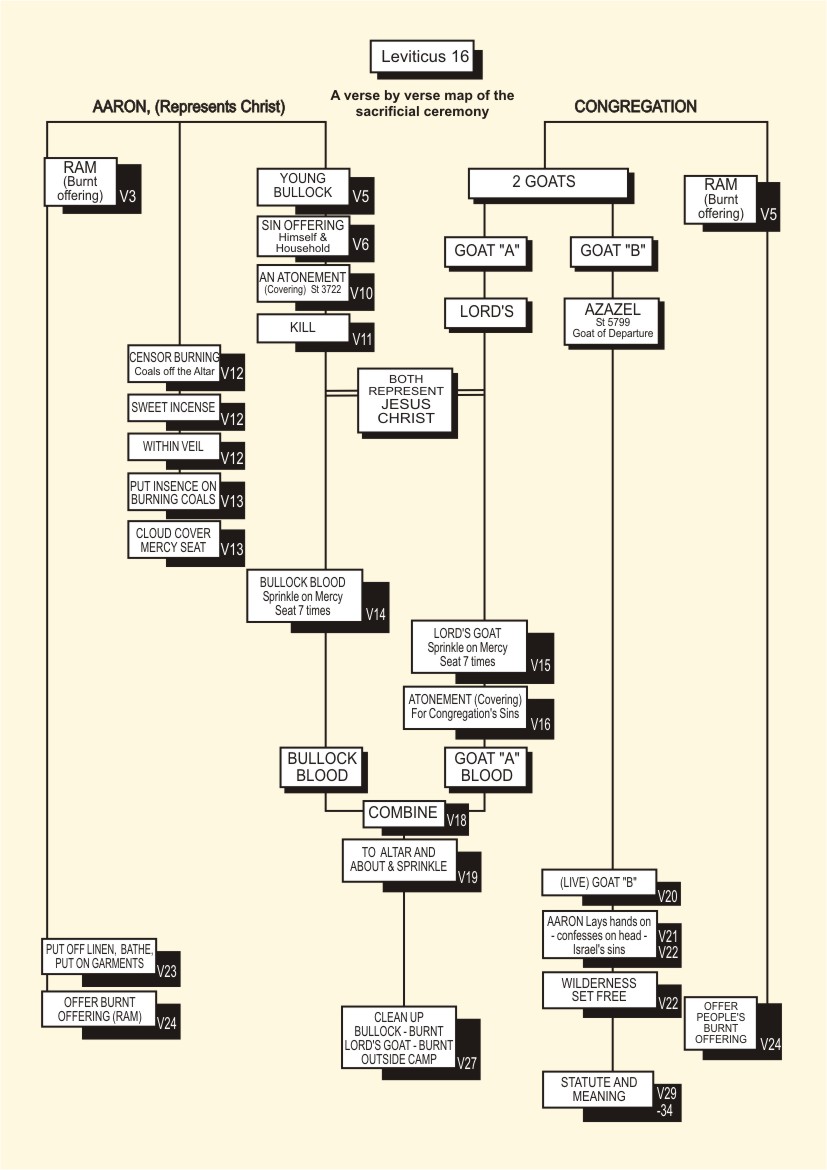
In this chart it is given in stages: cleansing of sin for the high priest; his household; the temple/tabernacle; the congregation; Jesus Christ's death; then in the future the rest of mankind.
************************************************************************
In the book of Leviticus 16 we are shown a strange ceremony that was given to the people (after the Exodus) not long after the Covenant was given on Mt Sinai (Exod 24:4-8).
Exodus reveals that the Old Covenant was made with the people of Israel 3 months out of Egypt.
The Tabernacle was erected on the 1st day of the 1st month of the SECOND year (Exod 40:17). The departure from Mt Sinai to Paran was on the 20th day of the second month of the second year (Num 10:11) So the ceremony for the Day of Atonement was established during this period.
The chart above shows the procedure the High Priest followed and the relevant scriptures in the Bible.
This day was given to God’s people to observe once a year so that they could be cleansed of their sins, by means of covering them. They were not forgiven permanently, only covered.
This ceremony was performed yearly and added to the Holy Day list in Leviticus 23:26 and Numbers 29:7.
Note the meaning of the words Atonement (Strong’s 3722) meaning ‘covering’, and ‘Azazel’ (Strong’s 5799) “Goat of Departure”.
Azazel is the “Goat of Departure” – we need to show what happens when this goat departs to the wilderness – by looking at the chart you will notice that goat ‘B’ or goat ‘2’ avoids the cleansing and coverings of the high priest and people, so it seems, that it misses out on its cleansing and forgiveness of sins!
Goat ‘B’ which is sent into the wilderness represents those that aren’t there, but those of future generations and all of humanity. (Rom 11:15, 2 Pet 3:9)
Being sent into the wilderness it only receives Aaron’s confession of sins but will at some point in the future receive the promise of redemption by the sacrifice of the real Lamb of God – Jesus Christ! But until then, like many that haven’t received Christ yet, is wondering in the wilderness.
The analogy for Christians is apparent. In our main study 'Secret of the Covenants' (Start Here) we have a pattern which emerges with the same theme - God's plan offering salvation to all.
See also 'The Extra Holy Days'
Go to: Main Study - Start Here
Teachings of Christ from Deuteronomy – Part 2
The Teachings of Christ from the *Covenant in Deuteronomy - Part 2
When we refer to the teachings of Christ we are referring to the direct teachings that Christ Himself spoke, as well as His teachings reflected by those He taught - that is, His Disciples.
Most Bibles have references in their margins, referring to Christ's teachings, that can be tracked back, in most cases, to the Book of Deuteronomy.
The following is Part 2 of a three part series of charts, with references from the *Covenant in Deuteronomy with corresponding teachings of Christ.
Note: this is not a comprehensive list and is being continually updated. (all references from the RSV Bible unless otherwise stated)
*(For more information on the Covenant in Deuteronomy please go to our main study - Welcome to our Study: Start Here)
Part 2: Statutes Governing Worship and a Holy Life:
Deuteronomy Chapters 12 -16
Deut 12:1 These are the statutes and ordinances that you must diligently observe in the land that the Lord, ... has given you to occupy all the days that you live …
- John 14:15 (Jesus) “If you love me, keep my commandments”
Deut 12:2-3 You must demolish completely all the places where the nations whom you are about to dispossess served their gods ...Break down their altars, smash their pillars…
- 1 Cor 10:14 (Paul) ... flee from the worship of idols.
Deut 12: 5-18 But you shall seek the place that the Lord your God will choose ... You shall go there, bringing your burnt offerings…
- John 4:20-23 (Jesus talking to the Women at the well) ... V23 when the true worshipers will worship the Father in spirit and truth, John 7: 2, 10, 14, 37 Jesus goes to the Feast
Deut 12: 9 Take care you do not neglect the Levite as long as you live in your land.
- 1 Cor 9:14 (Paul refers to those who serve in the temple) ... the Lord commanded that those who proclaim the Gospel should get their living by the gospel. Also 2 Cor 11:8-9
Deut 12:28 ... obey all these words so that it may go well with you and your children forever, because you will be doing what is good and right in the sight of the Lord
- Ephes 6: 1-3 Children, obey your parents in the Lord for this is right...so that it may be well with you…
Deut 12:30 Take heed that you do not ensnare to follow them, ... and that you do not inquire about their gods, saying ‘How did these nations serve their gods? - that I may do likewise.’
- Rom 1:20-23 ...they exchanged God, for images resembling a man, birds, animals
Deut 13:1-2 If a prophet arises among you,... and gives you a sign or a wonder ... and if he says, ‘Let us go after other gods’... you shall not listen to the words of that prophet...
- Matt 24:23-24 (V24) false messiahs and false prophets will appear, to lead astray...
Deut 14:1-2 You must not cut yourselves or shave your foreheads for the dead, for you are a people holy to the Lord your God …
- 1 Cor 6:9-10 ... the unrighteous will not inherit the Kingdom of God ... neither the immoral, nor idolaters, nor ... will inherit the Kingdom of God Also 1 Pet 2:9
Deut 14:3-21 You shall not eat any abominable thing. These are the animal you may eat: the ox, the sheep ... Animal that divide the hoof and chew the cud…
- Acts 10:14 (Peter) “No Lord, for I have never eaten anything that is common or unclean” Also Acts 11:8
Deut 14:22-26 “You shall tithe all the yield of your seed, which comes forth from the field year by year, in the place which He will choose, ... you shall eat the tithe…
- John 7:2, 10, 14 & 37 (V2) festival of booths was near ... (V10) after his brothers had gone to the festival, then he also went...(V37) the last day of the Feast, ... Jesus stood up…
Deut 14:28 At the end of every three years you shall bring forth all the tithe of your produce in the same year... the Levite, the widow, shall eat and be filled …
- Acts 4:32-37 (a similar concept of providing and sharing so everyone had according to their needs)
Deut 15:1 At the end of every seven years you shall grant a release,...every creditor shall release what he has lent ...because the Lord’s release has been proclaimed
- Luke 4:18-19 “... he has anointed me to proclaim release to the captives and recovering of sight ...liberty...the acceptable year of the Lord (commonly known as Year of Jubilee)
Deut 15:7 If there is among you a poor man...(V10) You shall give to him freely
- Rom 15:25 - 27 At present, however, I am going to Jerusalem with aid for the saints. For Macedonia and Achaia have been pleased to make some contribution for the poor among the saints at Jerusalem; they were pleased to do it, and indeed they are in debt to them, for if the Gentiles have come to share in their spiritual blessings, they ought also to be of service to them in material blessings., Also Luke 19:8, Gal 2:10, 2 Cor 9:8-9
Deut 15:12 ... he shall serve you 6 years, and in the seventh year you shall let him go free from you…
- (-)
Deut 15:19 All the firstling males that are born of your herds...you shall consecrate to the Lord…
- There is a New Covenant parallel for this verse as Jesus Christ was the sacrifice on which all would be saved. John 3:16-17 The sacrifice is that He was God’s only son and became flesh, John 1:14 and Phill 2: 5-8, He was without sin, Heb 4: 25 and 1 John 3: 5, therefore the firstborn of the dead is Christ, 1 Cor 15:23, also He was sinless - fitting the description of the first born male of the flock which was to be sacrificed.
Deut 16:1-8 ... keep the Passover to the Lord, for six days you shall eat unleavened bread, on the seventh day there shall be a solemn assembly to the Lord
- Luke 22:1,7 Now the Feast of Unleavened bread drew near, which is called the Passover. Also Matt 26:19, Luke 2:41
Deut 16:9 You shall count seven weeks ... feast of weeks (Pentecost)
- Acts 2:1 When the day of Pentecost had come, they were all together in one place…
Deut 16:13 You shall keep the feast of booths seven days
- John 7:2, 7, 10, 14, & 37 Now the Jew’s Feast of Tabernacles was at hand, (V10) then he also went up, not publically but in private.
Deut 16:16 Three times a year all your males shall appear before the Lord ... which he will choose; at the Feast of ULB, Feast of Weeks, Feast of Booths (Tabernacles)
- John 7:2, 10, 14 & 37 (V2) festival of booths was near ... (V10) after his brothers had gone to the festival, then he also went...(V37) the last day of the Feast, ... Jesus stood up…
- John 2: 23 Now when he was in Jerusalem at the Passover feast, many believed in his name when they saw the signs which he did;
.
Deut 16:18 You shall appoint judges and officers in all your towns, you shall not pervert justice...you shall not take a bribe..
- The principle of this scripture is to be of good conduct and honest, especially those in positions of authority. The following scriptures from Hebrews, Ephesians and James reflect this - Heb 13:18 ‘Pray for us, for we are sure that we have a clear conscience, desiring to act honorably in all things.’ Ephes 4:22 -32 and James 3:13-18
Deut 16:21-22 You shall not plant a tree as Asherah beside the altar of the Lord, ... you shall not set up a pillar, which the Lord your God hates.
- 1Co 6:9 Do you not know that the unrighteous will not inherit the kingdom of God? Do not be deceived; neither the immoral, nor idolaters, nor adulterers, nor sexual perverts,
Go to: Teachings of Christ from Deuteronomy: Part 1
Go to: Teachings of Christ from Deuteronomy: Part 3
Teachings of Christ from Deuteronomy – Part 1
The Teachings of Christ from the *Covenant in Deuteronomy - Part 1
When we refer to the teachings of Christ we are referring to the direct teachings that Christ Himself spoke, as well as His teachings reflected by those He taught - that is, His Disciples.
Most Bibles have references in their margins, referring to Christ's teachings, that can be tracked back, in most cases, to the Book of Deuteronomy.
The following is Part 1 of a three part series of charts, with references from the *Covenant in Deuteronomy with corresponding teachings of Christ.
Note: this is not a comprehensive list and is being continually updated. (all references from the RSV Bible unless otherwise stated)
*(For more information on the Covenant in Deuteronomy please go to our main study - Welcome to our Study - Start Here)
Part 1: The Ten Commandments:
Deut 5:7-21 The Ten Commandments
- You shall have no other gods before me. -
- Matt 4:10 Matthew writes: ‘Then Jesus said to him, "Begone, Satan! for it is written, 'You shall worship the Lord your God and him only shall you serve.”’ Also Luke 4:8
- Christ teaches: Matt 6:9 ‘Pray then like this: Our Father who art in heaven, Hallowed be thy name.’
- You shall not make for yourself a graven image (Idols), or any likeness of anything that is in heaven above, or that is on the earth beneath, or that is in the water under the earth; you shall not bow down to them or serve them; ...
- 1 Cor 6:9, Paul teaches: ‘Do you not know that wrongdoers will not inherit the kingdom of God? ... Fornicators, idolaters, adulterers ... none of these will inherit the kingdom of God’.
- 1 John 5:21 ‘Little children, keep yourselves from idols.’
- You shall not take the name of the LORD your God in vain: for the LORD will not hold him guiltless who takes his name in vain.
- Col 3:8, Paul teaches: ‘But now you must get rid of all such things - anger, wrath, malice, slander (blasphemy KJV), and abusive language from your mouth.’ (see also Rom 8:7)
- Observe the sabbath day, to keep it holy, as the LORD your God commanded you. Six days you shall labor, and do all your work; but the seventh day is a sabbath to the LORD your God; in it you shall not do any work, you, or your son, or your daughter, or your manservant, or your maidservant, or your ox, or your ass, or any of your cattle, or the sojourner who is within your gates, that your manservant and your maidservant may rest as well as you.
- Acts 13:14 ‘... And on the Sabbath day they went into the synagogue and sat down... v16: So Paul stood up and with a gesture began to speak: ...’
- Honor your father and your mother, as the LORD your God commanded you; that your days may be prolonged, and that it may go well with you, in the land which the LORD your God gives you.
- Ephes 6:1-2, Paul teaches: ‘Children, obey your parents in the Lord, for this is right. Honour your father and mother - this is the first commandment with a promise;’
- You shall not kill (murder).
- Rom 1:29, Paul writes: ‘They were filled with every kind of wickedness, ... Full of envy, murder, strife, deceit ...’
- Jesus teaches in Matt 5:21-22 "You have heard that it was said to the men of old, 'You shall not kill; and whoever kills shall be liable to judgment.' But I say to you that every one who is angry with his brother shall be liable to judgment; whoever insults his brother shall be liable to the council, and whoever says, 'You fool!' shall be liable to the hell of fire.
- Neither shall you commit adultery.
- Gal 5:19, Paul teaches: ‘Now the works of the flesh are obvious: fornication (adultery KJV), impurity, licentiousness, idolatry ... ‘
- Jesus teaches: Matt 5:27-28 "You have heard that it was said, 'You shall not commit adultery.' But I say to you that everyone who looks at a woman lustfully has already committed adultery with her in his heart.
- Neither shall you steal.
- Rom 13:9, Paul writes: ‘The commandments, ‘You shall not commit adultery; You shall not murder; You shall not steal; (bear false witness KJV), You shall not covert, ...’
- Neither shall you bear false witness against your neighbour.
- Again - Rom 13:9 ‘The commandments, ‘You shall not commit adultery; You shall not murder; You shall not steal; (bear false witness KJV), You shall not covert, ...’
- Neither shall you covet your neighbor's wife; and you shall not desire your neighbor's house, his field, or his manservant, or his maidservant, his ox, or his ass, or anything that is your neighbor's.'
- And again - Rom 13:9 ‘The commandments, ‘You shall not commit adultery; You shall not murder; You shall not steal; (bear false witness KJV), You shall not covert, ...’
Charts 8 & 9
These charts show the Statutes and Ordinances in Exodus and the Statutes and Ordinances in Deuteronomy, in a bit more detail than the previous charts, and to help illustrate the similarities we have highlighted the points that are the same in each book in green, and the points that are similar in both books we have highlighted in blue.
So you can see there are quite a few points that are different, which shows that the two covenants are not the same.
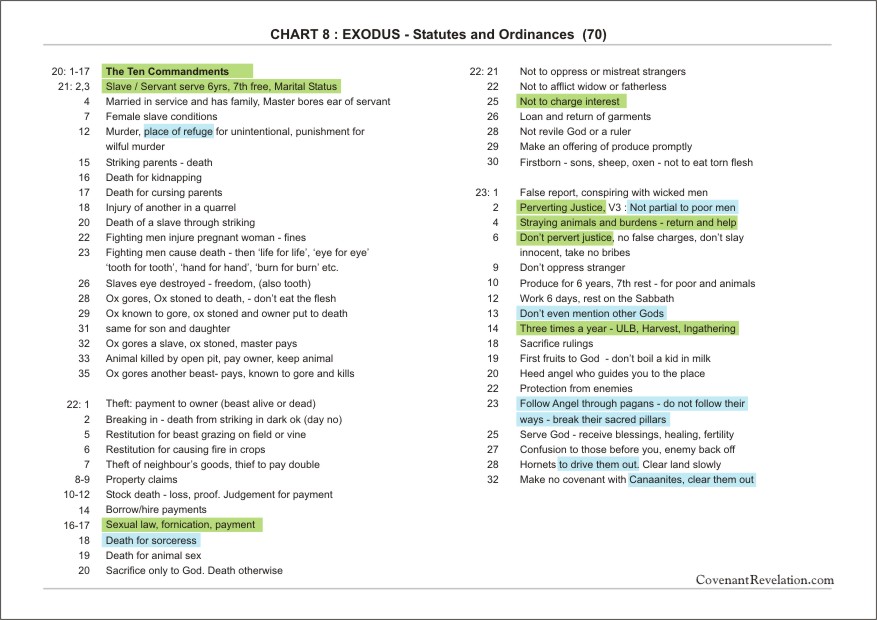
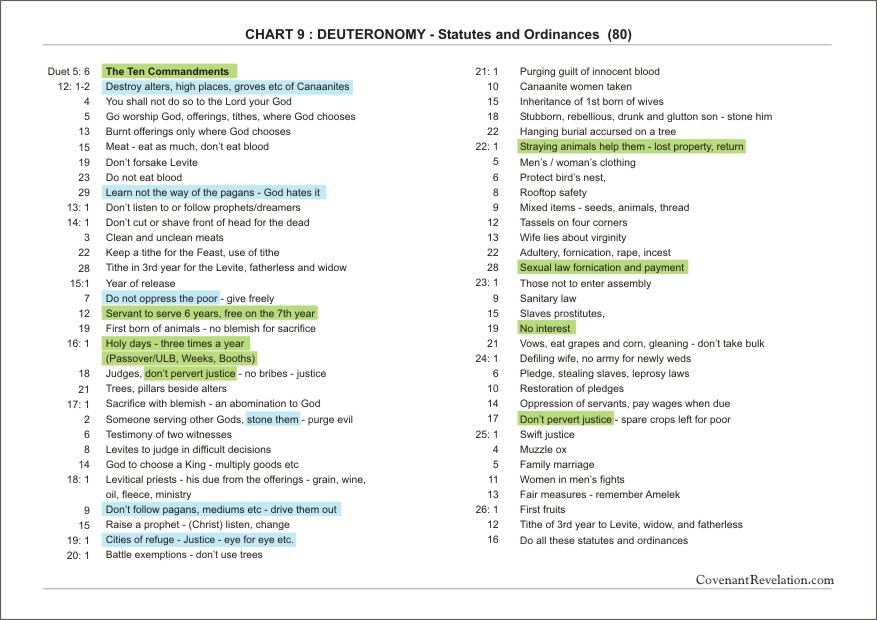
Deuteronomy 5 – 26 (Chart 6)
Chart 6: Deuteronomy chapters 5 - 26 in detail. (We will be referring to this section of Deuteronomy in the main study.)
We have presented an overview of the events in the whole book of Deuteronomy in Chart 5, now we need to see where the Covenant, given at Moab is recorded.
It is important to note that the 10 Commandments are a part of this second Covenant - it also introduces this Covenant as it does the first.
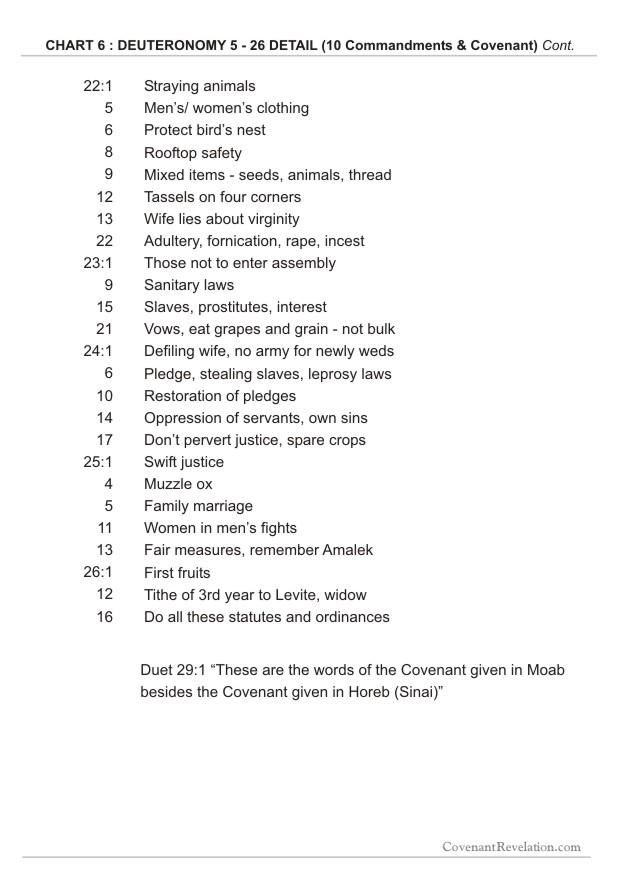
Deuteronomy Overview (Chart 5)
Book of Deuteronomy:
Deuteronomy is a book that once again talks about a covenant. It is at the end of Israel's wanderings. This Covenant, which includes the Ten Commandments, is delivered by Moses on the plains of Moab (Deut 29:1), forty years after the original Covenant was given by God at Mt Sinai.
This book also talks about the appointment of Joshua, conditions for blessings and cursings, and Moses' passing.
This book reveals some fascinating insights which will appear as the study progresses.

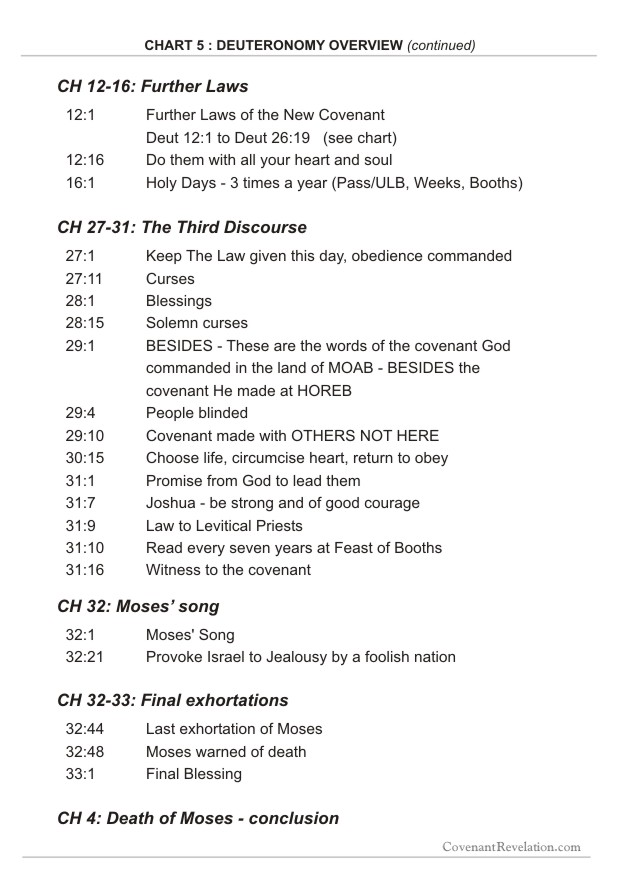
Return to : First Five Books of the Bible in a Nut Shell
Numbers Overview (Chart 4)
Book of Numbers:
The book of numbers charts the journey of the Israelites from Sinai to the promised land. Events recorded during their travels include - the mission of the spies; Korah's rebellion; various encounters with adjourning nations, and the Holy Days restated.
The final chapter finds the nation of Israel camped at the Jordan ready to enter the promised land having received boundaries from God.
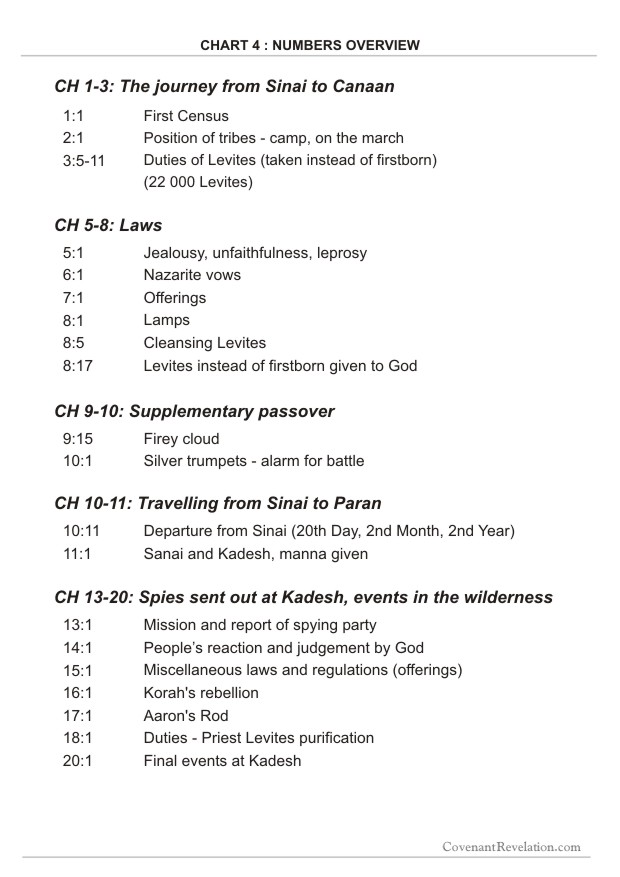
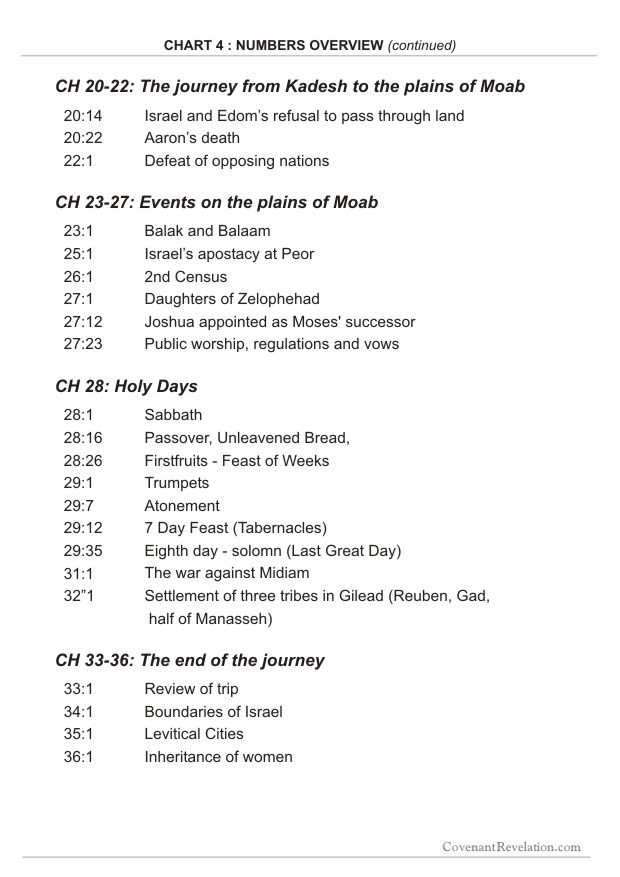
Return to: First Five Books of the Bible in a Nut Shell
Go to: Deuteronomy Overview (Chart 5)
Go to: Welcome to our Study - Start Here
Leviticus Overview (Chart 3)
The Book of Leviticus:
The setting is at Mt Sinai and the time is after the exodus from Egypt, just before starting the journey to the promised land, approx one year.
This book records the different offerings the Priests performed in the Tabernacle in the service to God. Also Aaron's priesthood is established and important rituals described, namely clean and unclean food, the Day of Atonement and Holy Days.
Other items of note are: Jubilee years, blessing and cursings, vows and tithes.
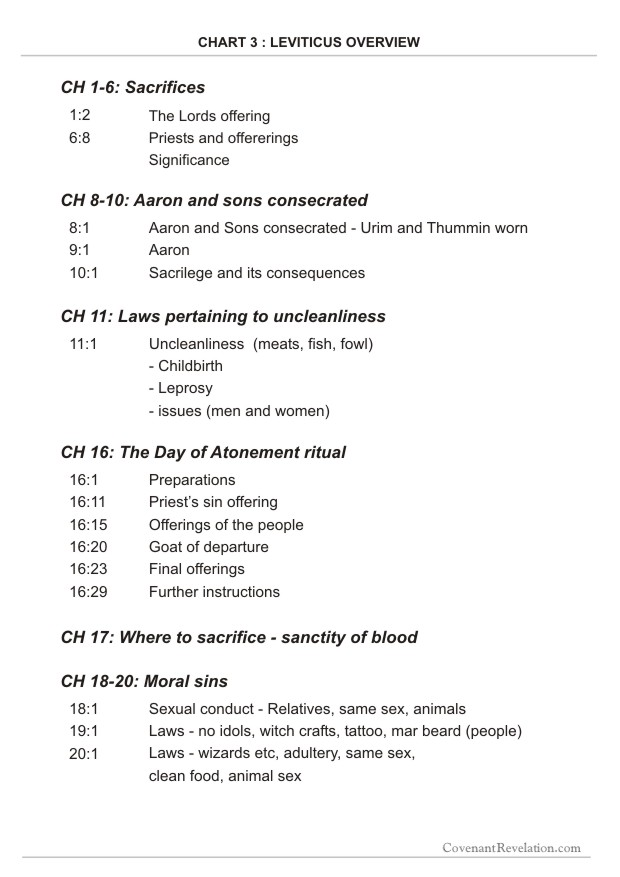
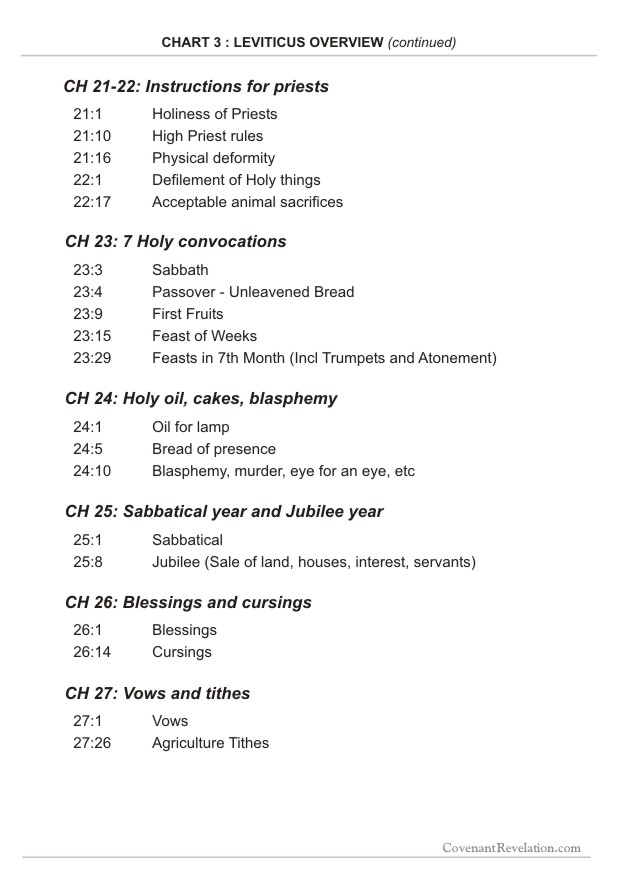
Go to: Numbers - Overview (Chart 4)
or back to: First Five Books of the Bible in a Nut Shell
Go to: Welcome to our Study - Start Here
Exodus 20 – 23 (Chart 2)
Chart 2: Exodus chapters 20 - 23 in detail (we will be referring to this section of Exodus in the main Study)
We have presented an overview of the events in the whole book of Exodus in Chart 1, Now we need to see where the Covenant, given on Mt Sinai is recorded. In Exodus chapter 19 it describes how it was delivered, but the actual Old Covenant, including the 10 Commandments, is written in Exodus chapters 20 to 23, and then ratified in chapter 24 (verse 8).
It is important to note that the 10 Commandments are a part of the Old Covenant - in fact it introduces the Covenant.
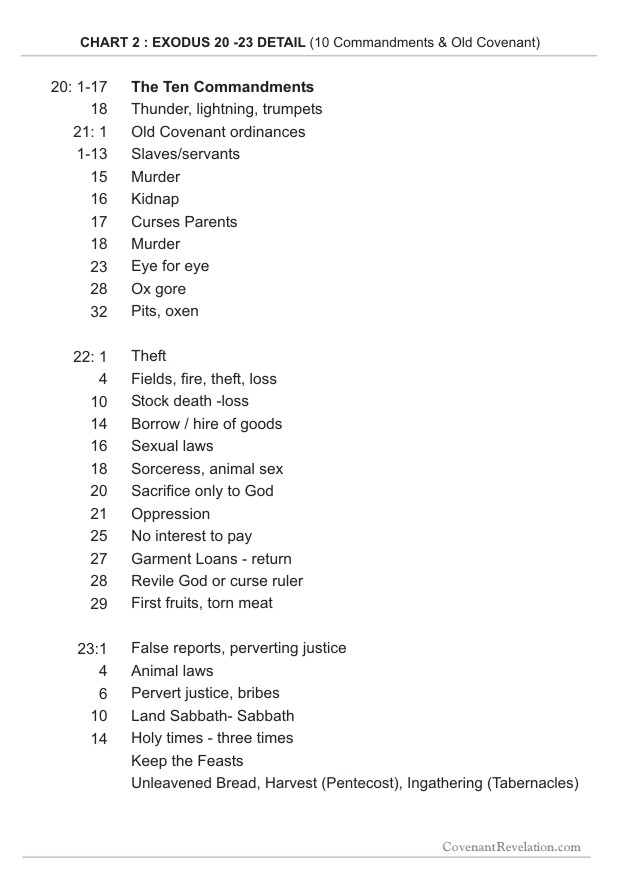
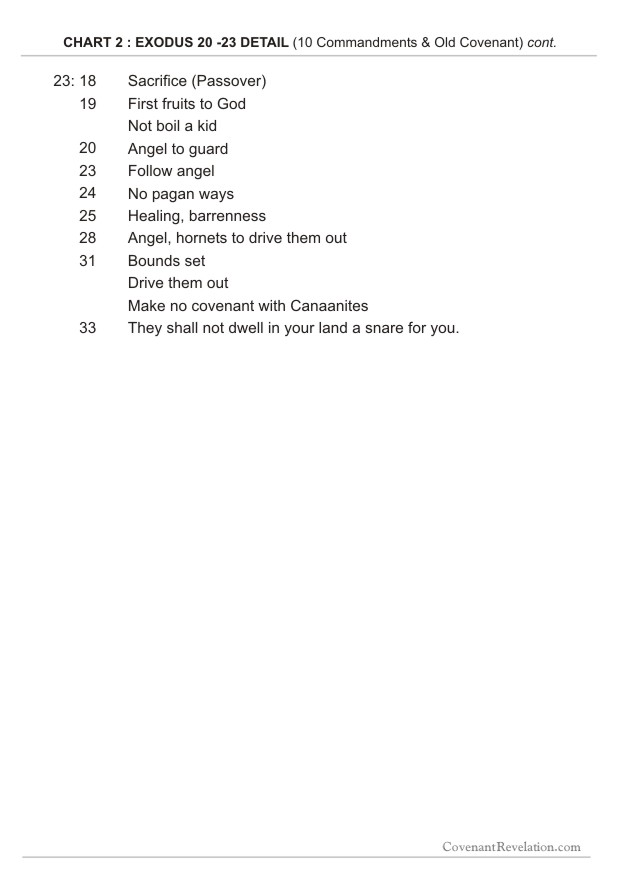
Go to : Leviticus - Overview (Chart 3)
or back to: First Five Books of the Bible in a Nut Shell
